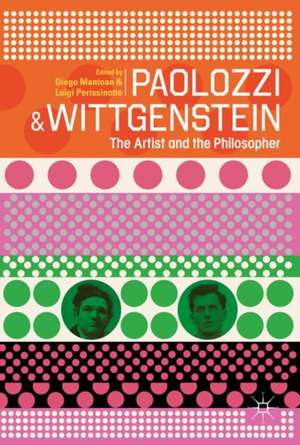Paolozzi and Wittgenstein: The Artist and the Philosopher
Editat de Diego Mantoan, Luigi Perissinottoen Limba Engleză Hardback – 22 mai 2019
With 13 diverse and comprehensive chapters, bringing together philosophers and art historians, this volume aims at retracing and pondering the influence of Wittgenstein on the idea of art in Paolozzi, thus giving an unprecedented insight into Wittgenstein’s philosophy as employed by contemporary artists.
Preț: 584.43 lei
Preț vechi: 687.56 lei
-15% Nou
Puncte Express: 877
Preț estimativ în valută:
111.83€ • 117.07$ • 92.53£
111.83€ • 117.07$ • 92.53£
Carte tipărită la comandă
Livrare economică 05-19 aprilie
Preluare comenzi: 021 569.72.76
Specificații
ISBN-13: 9783030158453
ISBN-10: 3030158454
Pagini: 196
Ilustrații: XII, 222 p. 16 illus., 13 illus. in color.
Dimensiuni: 148 x 210 mm
Greutate: 0.43 kg
Ediția:1st ed. 2019
Editura: Springer International Publishing
Colecția Palgrave Macmillan
Locul publicării:Cham, Switzerland
ISBN-10: 3030158454
Pagini: 196
Ilustrații: XII, 222 p. 16 illus., 13 illus. in color.
Dimensiuni: 148 x 210 mm
Greutate: 0.43 kg
Ediția:1st ed. 2019
Editura: Springer International Publishing
Colecția Palgrave Macmillan
Locul publicării:Cham, Switzerland
Cuprins
Chapter 1. An Introduction to the Artist who ‘needed’ Wittgenstein, Diego Mantoan &Luigi Perissinotto.- Part I. Aesthetic Grammar: from Wittgenstein to Paolozzi.- Chapter 2. Aesthetic Family Resemblances between Wittgenstein and Paolozzi, Silvana Borutti.- Chapter 3. The philosopher as artist: Ludwig Wittgenstein seen through Eduardo Paolozzi, Wolfgang Huemer.- Chapter 4. Paolozzi and the Diverse Manners of Ornamenting Wittgenstein in the Arts, Alessandro Del Puppo.- Chapter 5. Assembled pieces: collage techniques in the work of Eduardo Paolozzi and Ludwig Wittgenstein, Maren Wienigk.- Part II. Paolozzi: on Reading Wittgenstein.- Chapter 6. Paolozzi reads Wittgenstein: Moments in a Research Process, Luigi Perissinotto.- Chapter 7. “Ragged” Perception in Eduardo Paolozzi’s Figures from the 1950s, Rachel Stratton.- Chapter 8. Poetic Metaphor: Paolozzi’s Animated Films and Their Relation to Wittgenstein, Stefanie Stallschus.- Chapter 9. Assembling reminders for a particular purpose:Paolozzi’s ephemera, toys and collectibles, Diego Mantoan.- Part III. Wittgenstein: on Influencing Art.- Chapter 10. Experience and Interpretation: An Art Theoretical Commentary on Wittgenstein’s Conception of ‘Aspect’, Michael Lüthy.- Chapter 11. On a Certain Vagueness in the Definition of Art: Margolis’ Aesthetics and Wittgenstein’s Legacy, Roberta Dreon.- Chapter 12. The Sides of Limit and the Possibilities for Artistic Creation: On the Influence of Wittgenstein’s Philosophy on Contemporary Art, Davide Dal Sasso.- Chapter 13. Wittgenstein in New York (and elsewhere): From Paolozzi to Bochner in the 1960s, Francesco Guzzetti.- Appendix: The quotes in Paolozzi’s screenprint series As Is When (1964–65), Wolfgang Huemer & Diego Mantoan.
Notă biografică
Diego Mantoan, Assistant Professor in Contemporary Art History at Ca’ Foscari University Venice (Italy), works for renowned art archives across Europe and his earlier book “The Road To Parnassus” (2015) entered the 2016 Berger Prize long-list of The British Art Journal.
Luigi Perissinotto, Professor of Philosophy of Language and former Head of the Department of Philosophy and Cultural Heritage at Ca’ Foscari University Venice (Italy), is a renowned scholar of philosophy of language and a specialist in Wittgenstein.
Luigi Perissinotto, Professor of Philosophy of Language and former Head of the Department of Philosophy and Cultural Heritage at Ca’ Foscari University Venice (Italy), is a renowned scholar of philosophy of language and a specialist in Wittgenstein.
Caracteristici
Illuminates the links between Eduardo Paolozzi and Ludwig Wittgenstein Explores how Wittgenstein's idea of art influenced the initiator of pop art Provides cross-disciplinary insight into Wittengenstein's philosophy as applied to contemporary art
